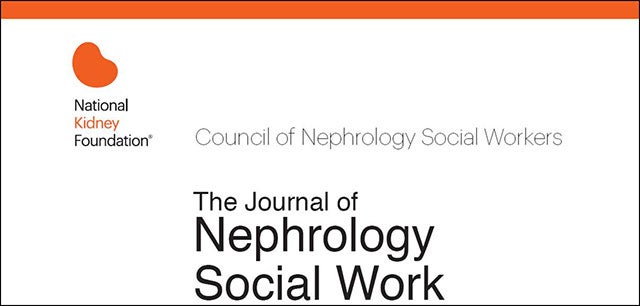The Journal Of Nephrology Social Work - Volume 39, Issue 2 (2015)

Table of Contents
Health-Related Quality of Life Among Patients Receiving Home Dialysis Therapies
Dodie M. Stein, PhD, MSW, LCSW, Indiana University Health Home Dialysis, Indianapolis, IN;
Janet L. Welch, PhD, RN, FAAN, Indiana University School of Nursing, Indianapolis, IN;
Michael A. Kraus, MD, Indiana University Health Home Dialysis, Indiana University School of Medicine, Indiana University Health Physicians Kidney Diseases, Indianapolis, IN;
James E. Slaven, MS, MA, Department of Biostatistics, Indiana University School of Medicine, Indianapolis, IN
Little is known about the health-related quality of life (HRQOL) of patients receiving daily home hemodialysis (DHHD) or peritoneal dialysis (PD). The purposes of this study are to describe the HRQOL of these patients and examine the effect of some demographic and illness characteristics on HRQOL. A total of 114 patients from a single Midwestern unit were included. Average physical component summary (PCS) scores were lower than the general population. Both DHHD and PD patients perceived themselves as having good mental health with mental component summary (MCS) scores at or above those of the general population. These results suggest that the control and independence provided by home therapies have a positive effect on patients’ outlook on life.
Download
Bringing Sanctuary to Dialysis
Shiloh D. Erdley-Kass, MSW, DSW, Bloomsburg University of Pennsylvania and Geisinger Medical Center, Bloomsburg, PA;
Yodit K. Betru, MSW, DSW, University of Pittsburgh, Pittsburgh, PA.
The demands of the chronically ill elderly population, underutilization of end-of-life care in dialysis, and the projected nursing shortage will have serious implications for dialysis staff care over the next decade. Little information exists regarding the effects of emotional labor on the dialysis staff and patient outcomes, or about effective programs that can be used to specifically address compassion fatigue in the dialysis unit setting. Masters–level social workers have the necessary training to facilitate in-center programs to reduce compassion fatigue symptoms, improve staff satisfaction and patient outcomes. The following article outlines a structured intervention aimed to address effective management of emotional labor experienced among dialysis unit professionals using the trauma-informed approach of the Sanctuary Model.
Download
Improving Health Literacy in Kidney Patients: Nephrology Social Workers as Leaders
Leanne Peace, MSW, MHA, Director, Missouri Kidney Program, Columbia, MO;
Molly Phillips, MPH, MSW, Manager, Health Promotion Programs and Policy, The Rogosin Institute Center for Health Action and Policy, New York, NY
This article will discuss two research studies related to health literacy (HL) and nephrology: one conducted with dialysis patients at facilities in New York City on health information seeking behaviors, and one conducted with nephrology social workers on their use of health literacy knowledge, tools, and assessments. The results of both studies were presented at a roundtable event hosted by The Rogosin Institute in New York City to inform a discussion around improving health literacy of renal patients, their families, and care teams. The authors define health literacy, then discuss the methods and findings from both studies, and finally, drawing from both studies, make recommendations for nephrology social workers to improve health literacy among kidney disease patients and their care partners.
Download
